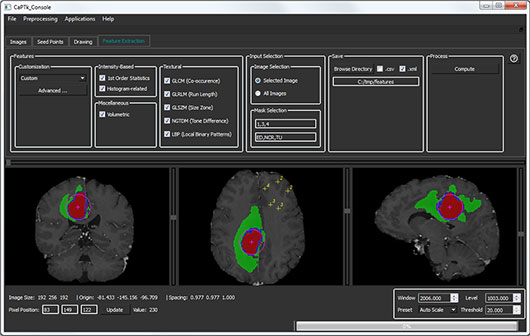The Center for Biomedical Image Computing and Analytics (CBICA) at the University of Pennsylvania has dedicated resources, including a core of software developers, to facilitate open-source software dissemination. CBIG is committed to advancing research by making publicly available datasets and software analytics acquired and/or developed by on-going research studies. We provide access to software developed by CBIG, which is now available for public release.
Laboratory for Individualized Breast Radiodensity Assessment (LIBRA)
LIBRA is a fully-automatic breast density estimation software solution based on a published algorithm that works on either raw (i.e., "FOR PROCESSING") or vendor post-processed (i.e., "FOR PRESENTATION") mammography images from a variety of mammography vendors. Based on an algorithm published in Medical Physics, LIBRA has been applied to over 30,000 screening exams and is being increasingly utilized in larger studies.
Example of a digital mammogram and the automated dense tissue segmentation by LIBRA
Cancer Imaging Phenomics Toolkit (CaPTk)

CaPTk is a software platform for analysis of radiographic cancer images, currently focusing on brain, breast, and lung cancer. CaPTk integrates advanced, validated tools performing various aspects of medical image analysis, including image segmentation, extensive panels of quantitative radiomic imaging features. and predictive modeling machine learning applications. CaPTk aims to facilitate the swift translation of advanced computational algorithms into routine clinical quantification, analysis, decision making, and reporting workflow. Its long-term goal is providing widely used technology that leverages the value of advanced imaging analytics in cancer prediction, diagnosis and prognosis, as well as in better understanding the biological mechanisms of cancer development. CaPTk has been developed by groups at the University of Pennsylvania and is distributed by the Center for Biomedical Image Computing and Analytics (CBICA).
For more information and to access the software, please visit:
www.med.upenn.edu/cbica/captk